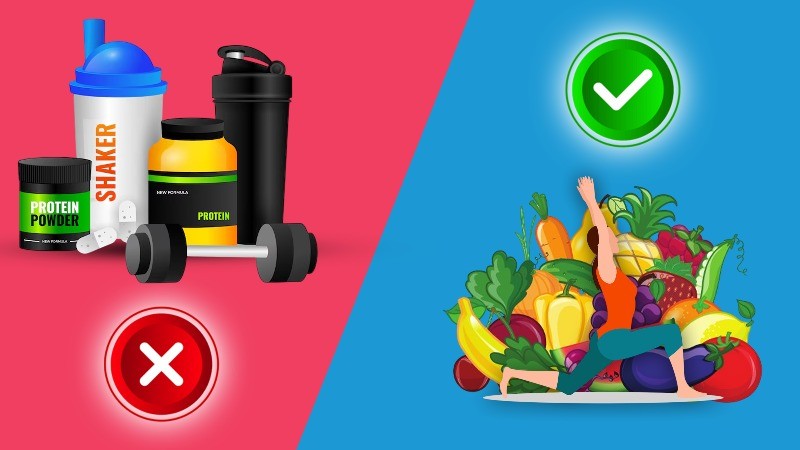
Health and fitness are just a trend these days, where we stick to food supplements, striving for a 'shortcut' to stay in good shape. The most widely consumed nutritional supplements include calcium, multivitamins, Vitamin B, C, D, and E, protein, and gut health supplements. But should you be consuming food supplements? Supplements can have side effects with mild risks. Even if posed to be natural, they are essentially damaging to vital organs. Especially if one has pre-existing health issues[2]. Even multivitamins do not decrease the risk of heart disease, cancer, or any mental decline[1]. If not harmful, they cannot keep you healthy in the long run. Opting for steroids, switching to pills, and all the other kinds of supplements in powdered or liquid form is just another way to escape a healthy diet and natural exercise. And should never be done unless stated by a healthcare provider after knowing, "Why do you need supplements?"
 Megha Guha strictly states not to consume any dietary, nutritional, or health supplements without a prescription from a medical practitioner
Megha Guha strictly states not to consume any dietary, nutritional, or health supplements without a prescription from a medical practitioner
According to Megha Guha, a Yoga instructor and nutritionist, supplements are only needed in specific cases and must be consumed when prescribed by a medical practitioner. That is, when:
An individual faces any kind of deficiency and is unable to meet the prescribed daily % value of proteins, vitamins, and minerals.
During the pregnancy and lactation period of women, they primarily face iron deficiency. Also, the breastfed infants need Vitamin D. This is when they are recommended to take Folic acid (400 micrograms daily)[2].
Even if one lacks any particular nutrient, they must have a complete checkup. Then take the dose and precautions as prescribed by the healthcare provider.
What can you do instead of consuming supplements?
You have all the nutrients right in your food. Supplements are in no way leading you to better health or freeing you from chronic diseases. But, consuming natural proteins, improving your lifestyle with a healthy diet and weight, along with exercising, surely can:
Natural proteins
Yogacharya Prarthna Dubey emphasizes the consumption of natural proteins, such as makhanas, groundnuts, Rajma (Kidney beans), Moong, Moth, and Anjeer, among others.
Even if someone wants to consume whey protein, Megha Guha adds, "Have plant and animal proteins together, but do not consume them in the powdered form, which comes packaged and endorsed by various brands. As for animal proteins, one can have salmon, fish, and lean meat, which provide Vitamin B12. Why waste money on supplements, go for what's there in the natural form."
 Yogacharya Prarthna Dubey stresses upon an improvement in lifestyle with the incorporation of a healthy diet along with yoga and exercise in the daily routine
Yogacharya Prarthna Dubey stresses upon an improvement in lifestyle with the incorporation of a healthy diet along with yoga and exercise in the daily routine People have more of a sedentary lifestyle these days, which ultimately affects their health. There is a need to switch to an active lifestyle for individual well-being. Here is what Prarthna Dubey recommends:
It is necessary to focus on chewing the food. We often forget that digestion begins in the mouth itself, right when you chew your food. Therefore, it is a must to chew your food about 30-32 times. It is the timing, eating pattern, and duration that set up proper digestion, which includes half food, a third of water, and one-fourth air. Moreover, take less quantity of food at once.
Ayurveda also calls for the chewing of water. This means, even water should be chewed instead of gulped for good health and body.
Firstly, saliva must be formed in the mouth by the salivary glands. Then it should be gulped inside, helping in digestion. Not many know that our saliva must reach the abdomen, too.
Breathing ensures blood circulation in the body. Stay connected with your breath whenever you inhale or exhale. Your breathing patterns can be improved with Yoga and exercise, amid nature.
Along with all the movement you do, it is also vital to incorporate a well-balanced diet into your routine. Reena Patel, a Zumba instructor, says, "There is no point in exercising or working out unless you do not focus on a healthy intake. You need to have a healthy diet, which includes solid proteins and liquid components, with more green vegetables. It's just that there should be less saturated fat, trans fat, and a balance of sugar and sodium levels."
For daily calcium intake, incorporate dairy foods in your diet that support your bone health. As far as Vitamin D is concerned, Prarthna Dubey adds, "Sun is the biggest source of Vitamin D. People have stopped going outdoors, forget about basking in the sun. It is essential to get 10-15 minutes of sunlight every day; otherwise, your body cannot absorb calcium. Neither can a Vitamin D capsule fulfill your Vitamin D requirements."
Along with a healthy diet, one must focus on maintaining a healthy weight. Your Body Mass Index (BMI) has to be appropriate and with fewer fluctuations.
_68512616044f6.jpg) Supplements are taking over the natural means of staying healthy
Supplements are taking over the natural means of staying healthy
Staying naturally fit by exercising is key to good health. These days, people tend to sit more, being part of desk jobs. But, it is important to stay active, if not necessarily running. Daily exercise is essential for physical fitness, skin health, as well as inner wellbeing. If not exercising, one must opt for a walk. Walking is especially essential for men for their prostate health and women's menstrual cycle.
Nature keeps it slow, so do the cells in our body. Taking it slow with yoga, in peace, helps your physical as well as emotional health. You can focus on your breathing by practicing asanas, which help in the proper functioning of the cells. Moreover, Yoga can improve your entire lifestyle, providing you with new zeal, confidence, and energy. Just one hour of yoga can keep you energetic throughout the day.
Gymming is very much a show-off thing these days. But it has its drawbacks. Firstly, it tightens the tissues, leaving no room for any flexibility. Secondly, there is less blood circulation due to the workout. Moreover, breathing through the mouth allows for a higher chance of affecting the thyroid.
But Megha Guha also states that one can combine the gym workout with other exercises. One can walk, opt for Zumba or pilates, and even sweat out in the gym. She says, "Staying healthy can be a balancing act sometimes. A combination of active movement and fitness activities can prove to be effective in the long run."
In the end, one must remember that you cannot really replace natural means of staying fit and healthy, however much you incline towards supplements. As mentioned above, they might not be harmful, but they aren't necessarily healthy either in the long term. And should be consumed only when advised by a medical practitioner.
Johns Hopkins Medicine. (2024). Is there really any benefit to multivitamins? Johns Hopkins Medicine. Retrieved June 17, 2025, from https://www.hopkinsmedicine.org/health/wellness-and-prevention/is-there-really-any-benefit-to-multivitamins
National Institutes of Health. (2013, August). Should you take dietary supplements? NIH News in Health. Retrieved June 17, 2025, from https://newsinhealth.nih.gov/2013/08/should-you-take-dietary-supplements